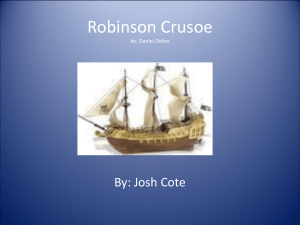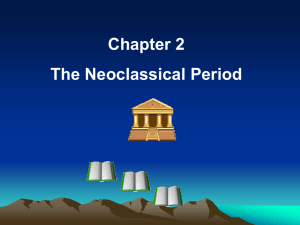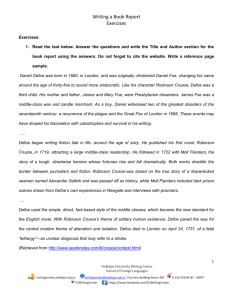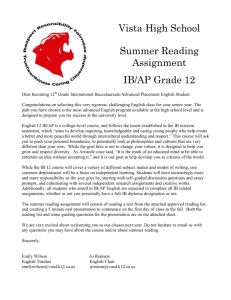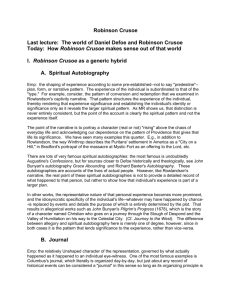Robinson Crusoe: The First Novel (Damrosch 373)
advertisement
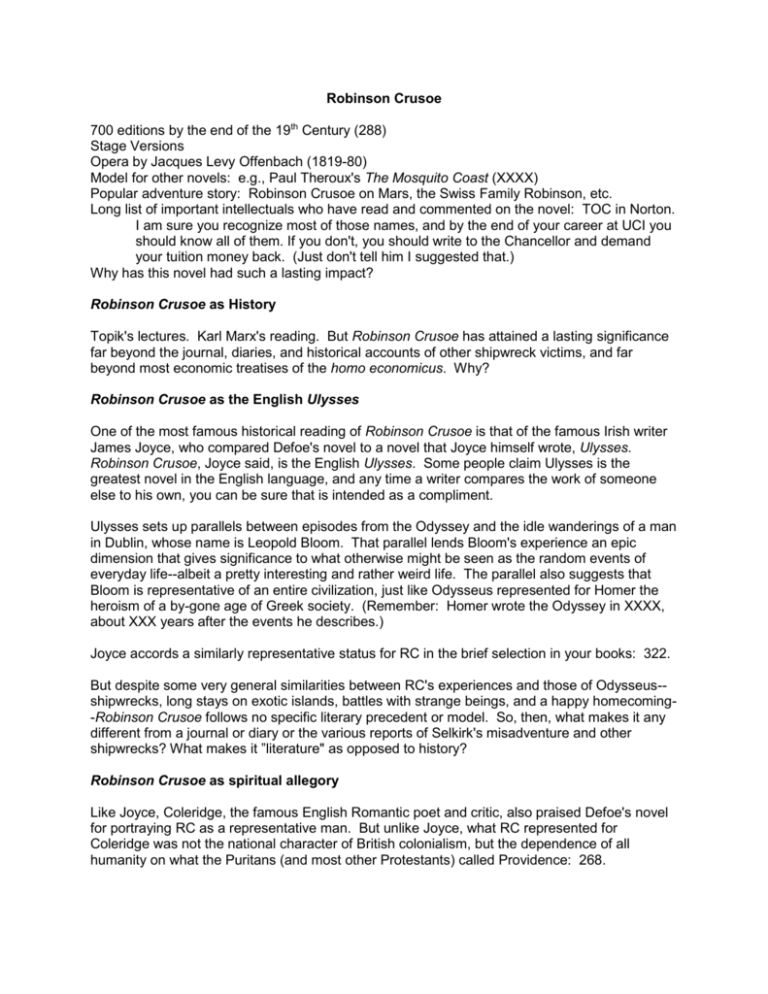
Robinson Crusoe 700 editions by the end of the 19th Century (288) Stage Versions Opera by Jacques Levy Offenbach (1819-80) Model for other novels: e.g., Paul Theroux's The Mosquito Coast (XXXX) Popular adventure story: Robinson Crusoe on Mars, the Swiss Family Robinson, etc. Long list of important intellectuals who have read and commented on the novel: TOC in Norton. I am sure you recognize most of those names, and by the end of your career at UCI you should know all of them. If you don't, you should write to the Chancellor and demand your tuition money back. (Just don't tell him I suggested that.) Why has this novel had such a lasting impact? Robinson Crusoe as History Topik's lectures. Karl Marx's reading. But Robinson Crusoe has attained a lasting significance far beyond the journal, diaries, and historical accounts of other shipwreck victims, and far beyond most economic treatises of the homo economicus. Why? Robinson Crusoe as the English Ulysses One of the most famous historical reading of Robinson Crusoe is that of the famous Irish writer James Joyce, who compared Defoe's novel to a novel that Joyce himself wrote, Ulysses. Robinson Crusoe, Joyce said, is the English Ulysses. Some people claim Ulysses is the greatest novel in the English language, and any time a writer compares the work of someone else to his own, you can be sure that is intended as a compliment. Ulysses sets up parallels between episodes from the Odyssey and the idle wanderings of a man in Dublin, whose name is Leopold Bloom. That parallel lends Bloom's experience an epic dimension that gives significance to what otherwise might be seen as the random events of everyday life--albeit a pretty interesting and rather weird life. The parallel also suggests that Bloom is representative of an entire civilization, just like Odysseus represented for Homer the heroism of a by-gone age of Greek society. (Remember: Homer wrote the Odyssey in XXXX, about XXX years after the events he describes.) Joyce accords a similarly representative status for RC in the brief selection in your books: 322. But despite some very general similarities between RC's experiences and those of Odysseus-shipwrecks, long stays on exotic islands, battles with strange beings, and a happy homecoming-Robinson Crusoe follows no specific literary precedent or model. So, then, what makes it any different from a journal or diary or the various reports of Selkirk's misadventure and other shipwrecks? What makes it ”literature" as opposed to history? Robinson Crusoe as spiritual allegory Like Joyce, Coleridge, the famous English Romantic poet and critic, also praised Defoe's novel for portraying RC as a representative man. But unlike Joyce, what RC represented for Coleridge was not the national character of British colonialism, but the dependence of all humanity on what the Puritans (and most other Protestants) called Providence: 268. That dependence was often described in terms of the pattern of conversion and redemption that we examined in Rowlandson's captivity narrative. That pattern structures the experience of the individual, thereby rendering that experience significance and establishing the individual's identity or significance in that larger scheme. In this sense, we can treat the pattern of conversion or redemption as a "plot" in the narrative sense. We could therefore say that Providence serves the same function in Robinson Crusoe that the Odyssey does in Joyce's novel Ulysses. There are specific precedents for using Providence to structure and explain the significance of an individual's personal experience: the most famous is undoubtedly Augustine's Confessions, but for sources closer to Defoe historically and theologically, see John Bunyan's autobiography Grace Abounding and Richard Baxter's Autobiography. These autobiographies are accounts of the lives of actual people. However, like Rowlandson's narrative, the real point of these spritiual autobiographies is not to provide a detailed record of what happened to that person, but rather to show how that individual's experience is part of a larger plan. In other works, the representative nature of that personal experience becomes more prominent, and the idiosyncratic specificity of the individual's life--whatever may have happend by chance-is replaced by events and details the purpose of which is entirely determined by the plot. That results in allegorical works such as John Bunyan's Pilgrim's Progress (1678), which is the story of a character named Christian who goes on a journey through the Slough of Despond and the Valley of Humiliation on his way to the Celestial City. (Cf. Journey to the West). This emphasis on the pattern over the experience results in spiritual allegories. (A secular version of this type of writing was called romance, whose root, roman, is the French word for "novel.") Thus, the difference beween spiritual autobiogaphy and spiritual allegory is more a matter of degree than of kind. In both cases, the point of the narrative is to portraying a character (real or not) "rising" above the chaos of everyday life and acknowledging our dependence on the pattern of Providence that gives that life its significance. We have seen many examples this quarter. E.g., in addition to Rowlandson, the way Winthrop describes the Puritans' settlement in America as a "City on a Hill," in Bradford's portrayal of the massacre at Mystic Fort as an offering to the Lord, etc. Do some examples from the novel of the narrator translating RC's experience into terms of spiritual conversion and redemption. Robinson Crusoe as the first novel (Damrosch 373)? For both Joyce and Coleridge, then, the importance of Robinson Crusoe is that its main character is representative of some general truth, either about about the national character of the English (Joyce) or the Providential dimension of history (Coleridge). But as we saw in Bradford's history and Rowlandson's narrative, the fit between any pattern and human experience is seldom perfect. You either had to ignore what did not fit (Rowlandson) or abandon the structure altogether (Bradford in the later chapters of his history). In Robinson Crusoe, however, that tension is much less overt, but it is still there. We get a sense of it in Joyce's paradoxical claim that errors of fact and the many unrealistic coincidences in Robinson Crusoe are insignificant because they are washed away in the "flood" of Defoe's "new realism": 323. As you can do doubt infer from Joyce's implied contrast between facts and "realism," that term does not imply an exact correspondence between text and world, or an accurate portrayal ofthe way things "really" are. Rather, "realism" refers to a particular style of literature that Defoe is often credited with inventing. It involves an account of the concrete details of everyday life, just like histories and journals, but it shaped those details in such a way as to give us insight into the significance of those details in the lives of the people and societies represented in and through those details--as opposed to the less selective account of events and details reported journals and histories. Thus, Joyce does not seem worried about the tension between pattern and experience in the remark about Defoe because that tension had fact become one of the principle characteristics of a form of writing that Defoe helped initiate in the eighteenth century: the "novel." In the terms of this quarter, we could say that the novel combines the detail events of the journal or eyewitness account with the formal rigor of the spiritual autobiography. This shaping resulted in a formal structure that was derived more from the traditions of allegory and romance. The structure of the novel differed from those precedents, however, in one very important way that helped avoid the conflict between pattern and experience. The significance of experience that was revealed by the shaping of the novelistic narrative was usually based in the lives of individuals--vs. for example Providence and God; those individuals are usually associated with what we would think of today as a middle-class culture--as opposed to the nobility shipwrecked with Prospero, for example; and their actions are driven by motivations that are usually economic, social, and/or what we would call today psychological--and not based on transcendent sources of divine inspiration, grace, or Providence. The novel was thus associated with an increasingly secular outlook that valued empirical observation and experimentation over revelation; looked to social, economic, and (eventually) psychological causes rather than Providence to explain events; and elevated the authority of the individual observer over that of the scholar, minister, or Scriptural text. Another way to say this is that the order or significance of human experience was to be found in this material world rather than in the realm of the spirit, even though that significance was itself ultimately derived from a spiritual source. Altogether, these features make up the "flood" of "new realism" that Joyce praised for turning RC into an ideal representative of British colonialism despite the many factual inaccuracies and perposterious coincidences that make the novel "unrealistic" in the sense of an accurate portrayal of real life. They constituted a brand new kind of writing, one that would quickly be labeled "the novel," and Robinson Crusoe is often cited as one of the earliest examples of this genre. (The Oxford English Dictionary lists the first appearance of this term with this general meaning about 1700, and it was half a century later before the term was used to designate what we would call "the novel" today.) Robinson Crusoe fits most of these criteria, which is why it is often called the first novel. RC is a seed merchant and adventurer (economic as well physical) who builds up a small supply of money and goods into a respectable fortune--a good definition of the middle-class merchant of his day. His narrative is suffused with concrete details about the stuff of everyday life (bread, tools, etc.), and much of his time is devoted to reproducing as closely as possible the bourgeois way of life that he was so anxious to leave as a young man, from his shelter to his farms and even to his pets. The account of these realistic details is hardly the random accumulation of experiences characteristic of the journal or eyewitness account, however. The novel is shaped from the beginning by the retrospective nature of the narration, that is written long after RC has left the island and that is distinguished clearly from the journal he keeps until he runs out of ink. That retrospective narration explicitly attempts to explain the significance of RC's actions, which explain--empirically through the experiment--the natural origins of production (and the errors of contemporacy European economics); which are usually the result of motives are that immediately recognizable as basic human needs--fear, hunger; and which usually reflect the social prejudices and practices of his time, including, of course, an unquestioning believe in social hierarchy and a comcommitant belief in the superiority of European civilization over savage customs of the natives, most notably, cannibalism. Do some examples of realism from the novel. Robinson Crusoe as a Historical Hybrid Yet, we have already seen the spiritual causality of Providence at work in the novel as well, and that aspect of the novel seem to look back to the world of allegory rather than forward to the world of realism. Readers who argue that Robinson Crusoe is the first novel explain its allegorical aspects as simply a vestige of outdated forms such as allegory or romance. Other readers reject that interpretation as anachronistic--how could Defoe know where the novel was heading when it did not even exists yet?--and argue instead that the book should be read as a spiritual autobiography in which concrete detail and personal experience is exaggerated beyond all precedent but without the clearly defined purpose and function it would take on later as "the novel" became a recognized literary form. At this point in the course, you are well qualified to decide which reading you think is more productive. Last quarter you read two examples of rather extreme realism--Heart of Darkness and Second-Class Citizen, and you read works that are much more typical of romance and allegory: The Tempest, and Journey to the West. In addition, this quarter you have just studied examples of spiritual autobiography similar to what Defoe's own readers would have read (Bradford and Rowlandson). So you should have an informed opinion about which side of the line Defoe belongs on, about whethere or not Robinson Crusoe is really an example of novelistic realism, or spiritual autobiography. Rather than trying to answer that question, I want to spend the rest of the lecture on a different kind of question: what is the historical significance of the stylistic mixture itself? Thesis: Robinson Crusoe is written at a moment when European society as a whole was becoming increasingly secular, and the conflict of styles results from an effort to transform sacred authority into social order. That transformation internalizes divine Providence as individual desire, and externalizes spiritual conversion as the cultivation of land and the reformation of social order. The result as a justification of colonialism in the case of RC, but it opened colonialism up to ethical examination on the basis of what it did in the world (rather than just its good intentions)--and on the basis of who was doing it, the individual character/identity of the colonialist. Next week, with Crevecoeur, we will read just such an examination.

